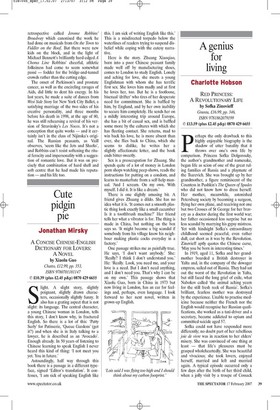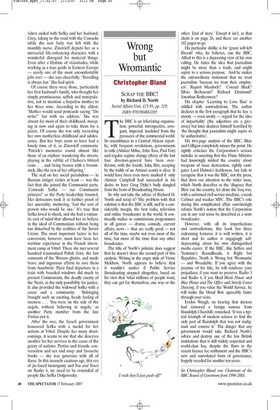A genius for living
Charlotte Hobson RED PRINCESS: A REVOLUTIONARY LIFE by Sofka Zinovieff Granta, £16.99, pp. 346, ISBN 9781862079199 © £13.59 (plus £2.45 p&p) 0870 429 6655 perhaps the only drawback to this highly enjoyable biography is the shadow of utter banality that it throws over one's own life by comparison. Princess Sofka Dolgorouky, the author's grandmother and namesake, began life as scion of one of the great ruling families of Russia and a playmate of the Tsarevich. She was brought up by her grandmother, a figure reminiscent of the Countess in Pushkin's The Queen of Spades who did not know how to dress herself. Her mother, meanwhile, astonished Petersburg society by becoming a surgeon, flying her own plane, and receiving not one but two Crosses of St George for her bravery as a doctor during the first world war; her father occasioned less surprise but no less scandal by marrying his gypsy mistress. Yet with hindsight Sofka's extraordinary childhood seemed peaceful, even rather dull, cut short as it was by the Revolution. Zinovieff aptly quotes the Chinese curse, 'May you be born in interesting times.'
In 1919, aged 11, Sofka and her grandmother boarded a British destroyer in Yalta and, in the company of the dowager empress, sailed out of Russia. They had sat out the worst of the Revolution in Yalta, but still faced the long grief of exile, what Nabokov called `the animal aching yearn for the still fresh reek of Russia'. Sofka's brilliant, fearless mother was destroyed by the experience. Unable to practise medicine because neither the French nor the English would recognise her Russian qualifications, she worked as a taxi-driver and a secretary, became addicted to opium and committed suicide aged 57.
Sofka could not have responded more differently; no doubt part of her rebellious joie de vivre was in reaction to her elders' misery. She was convinced of one thing at least — that life's pleasures must be grasped wholeheartedly. She was beautiful and vivacious; she took lovers, enjoyed herself, married and left and married again. A typical episode occurred only a few days after the birth of her third child, when a jolly visit by a troupe of Cossack riders ended with Sofka and her husband, Grey, taking to the road with the Cossacks while the new baby was left with the monthly nurse. Zinovieff depicts her as a mercurial, life-enhancing character, with a wonderful disregard for material things. Even after a lifetime of vicissitudes, while working as a tour guide in Eastern Europe — surely one of the most uncomfortable jobs ever — she says cheerfully, 'Travelling is always fun.' She had spirit.
Of course there were those, particularly her first husband's family, who thought her simply promiscuous, selfish and manipulative, not to mention a hopeless mother to her three sons. According to the eldest, 'Mother would send postcards saying "Do write!" but with no address.' She was absent for most of their childhood, sweeping in now and again to take them for a picnic. Of course she was only recreating her own motherless childhood and adolescence. But her boys seem to have had a lonely time of it, as Zinovieff comments: 'Patrick's memories sound almost like those of an orphan: wandering the streets, playing in the rubble of Chelsea's blitzed ruins. . . and being beaten with a broomstick, like the rest of her offspring.'
The seal on her social pariahdom — in Russian émigré circles at least — was the fact that she joined the Communist party. 'Comrade Sofka — our Communist princess!' as the Party leadership boasted. Her detractors took it as further proof of her amorality, muttering, 'Just the sort of person who would be one.' It's true that Sofka loved to shock, and she had a romantic cast of mind that allowed her to believe in the ideal of Communism without being too disturbed by the realities of the Soviet Union. The most important factor in her conversion, however, must have been her wartime experience in the French internment camp at Vittel. There she met several hundred traumatised Polish Jews, the last remnants of the Warsaw ghetto, and made brave and ingenious efforts to save them from Auschwitz. Their final departure in a train with boarded windows did much to present Communism, the deadly enemy of the Nazis, as the only possibility for justice. It also provided the widowed Sofka with a cause and a community: 'Belonging brought such an exciting, heady feeling of oneness . . . You were on the side of the angels, without believing in angels,' as another Party member from the late Forties put it.
After the war, the Israeli government honoured Sofka with a medal for her actions at Vittel. Despite her many shortcomings, it seems to me that she deserves another for her services in the cause of the gaiety of nations. Parties and friends, conversation and sex and soup and favourite books — she was generous with all of these. In this insanely cautious age, this era of po-faced monogamy and You and Yours on Radio 4, we need to be reminded of people like Sofka Dolgorouky.


























































 Previous page
Previous page